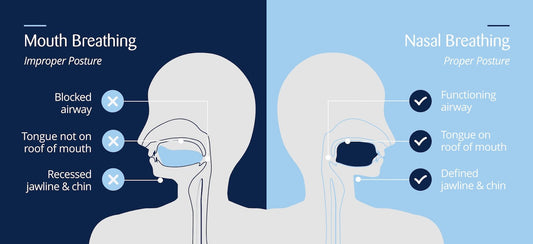Do you breathe through your mouth or your nose?
Most of us don't give much thought to how we're breathing throughout the day. But the way you breathe actually matters more than you might think.
Making a conscious effort to breathe through your nose rather than your mouth offers some surprising benefits for your mind and body.
What Is Nose Breathing?
Nose breathing simply refers to inhaling and exhaling air through your nose instead of your mouth.
Also called nasal breathing, this is the natural way we're meant to breathe, as the nose functions as a type of air filter and humidifier.
Yet, many of us develop a tendency to mouth breathe, especially when exerting ourselves or when our nasal passages become congested.
Mouth breathing bypasses the nose's built-in filtration system and can lead to dry mouth, bad breath, and other issues. Practicing purposeful nose breathing exercises the nasal airways so they work more efficiently to deliver oxygen to the lungs.
Benefits of Breathing Through Your Nose
Switching from mouth to nose breathing offers advantages for respiratory health, athletic performance, immune function, and more. Here are some of the top benefits of nose breathing:
- Improves oxygen intake. The nostrils filter and humidify incoming air, removing allergens and preventing the airways from drying out. This allows more oxygen to reach the lungs compared to mouth breathing. Better oxygenation boosts energy levels.
- Promotes relaxation. Nose breathing activates the parasympathetic nervous system which controls rest and digestion. This lowers heart rate and blood pressure, inducing a calm, tranquil state.
- Strengthens respiratory muscles. The controlled breathing patterns of nasal breathing provide resistance that trains the diaphragm and intercostal muscles used for respiration. Over time this expands lung capacity.
- Reduces snoring and sleep apnea. Breathing through the nose prevents the throat tissues from drying out during sleep which can cause snoring and sleep apnea episodes. This improves sleep quality.
- Alleviates allergy symptoms. Inhaling through the nose allows allergens like pollen or pet dander to be filtered out before entering the lungs, reducing allergy flare ups.
- Improves athletic performance. The increased oxygenation supplies muscles with more energy to enhance endurance, speed recovery, and maximize workouts. This is why many athletes practice yogic nose breathing.
- Supports immune health. Nitric oxide produced in the nasal passages has antimicrobial properties that help fight infections. Nose breathing may reduce frequency of colds.
Starting a Nose Breathing Practice
Convinced of the benefits? Here are some tips on HOW to train yourself to become a nose breather:
- Tape your mouth at night. Use our SomaBody mouthtape over your lips will prevent mouth breathing during sleep so you wake up refreshed.
- Do breathwork exercises. Practices like kapalabhati and nadi shodhana pranayama help strengthen the nasal passageways and increase lung capacity over time.
- Manage stress levels. High stress often correlates to mouth breathing and shallow breaths. Try meditation, yoga, or walks outdoors to lower anxiety.
- Improve posture. Slouching restricts the airway and diaphragm and promotes mouth breathing. Stand and sit tall to allow deep nasal inhalations.
- Clear congestion. Stay hydrated, use a saline spray, or take a hot shower to open a stuffed nose temporarily blocking nasal breathing.
- Wear breathable fabrics. Tight tops or high collars can constrict throat muscles and block air flow. Stick to loose, breathable clothing.
With routine practice, nose breathing will start to feel natural. At first you may get winded or need to supplement with mouth breathing during intense workouts. But gradually nasal breathing will become easier to maintain for longer periods.
The Payoff for Sticking With It
Transitioning to consistent nose breathing brings tremendous benefits over time including:
- Better sleep. Falling asleep and staying asleep becomes easier with reduced mouth drying and improved oxygenation.
- Increased energy. Taking in more air revitalizes the body's systems, making you feel more awake and alert throughout the day.
- Sharper focus. The brain functions optimally with maximum oxygen supplied by mindful nose breathing.
- Less illness. Allergies, colds, and other viruses are kept at bay thanks to improved immune defenses.
- Reduced stress. The calming effects of nasal breathing lower blood pressure and cortisol levels for fewer anxiety symptoms.
- Healthier respiratory function. Lung capacity expands enabling more powerful, efficient respiration long-term.
Simply being aware of your breath and making a committed effort to inhale and exhale through your nose can profoundly impact wellbeing over time. The many whole-body perks are well worth sticking to this healthy lifelong habit.
Your mind and body will thank you!




